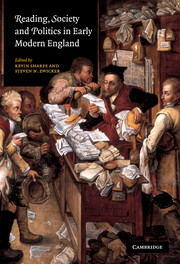Book contents
- Frontmatter
- Contents
- List of illustrations
- List of contributors
- Acknowledgements
- Introduction: discovering the Renaissance reader
- Part I THE MATERIAL TEXT
- 1 Errata: print, politics and poetry in early modern England
- 2 Abandoning the capital in eighteenth-century London
- Part 2 READING AS POLITICS
- Part 3 PRINT, POLITICS AND PERFORMANCE
- Part 4 READING PHYSIOLOGIES
- Part 5 READING IN THE TIME
- Index
2 - Abandoning the capital in eighteenth-century London
Published online by Cambridge University Press: 22 September 2009
- Frontmatter
- Contents
- List of illustrations
- List of contributors
- Acknowledgements
- Introduction: discovering the Renaissance reader
- Part I THE MATERIAL TEXT
- 1 Errata: print, politics and poetry in early modern England
- 2 Abandoning the capital in eighteenth-century London
- Part 2 READING AS POLITICS
- Part 3 PRINT, POLITICS AND PERFORMANCE
- Part 4 READING PHYSIOLOGIES
- Part 5 READING IN THE TIME
- Index
Summary
Total and sudden transformations of a language seldom happen.
Samuel JohnsonThis essay attempts to define a problem concerning printing history and cultural change that has intrigued and often baffled me for the past twenty-five years. I begin by describing a phenomenon that is literally minuscule: the gradual abandonment of pervasive capital letters (majuscules), as well as italics, in English books published during the middle decades of the eighteenth century. I attempt to relate this important change in printing practice to the roles of author, bookseller and printer during this period, to the growth (and diversification) of the reading public in England, and to other cultural phenomena of the 1750s – the publication of Johnson's Dictionary and the adoption of the Gregorian calendar, in particular – with which these changes in the printing house might profitably be associated. My research suggests that such a fundamental shift in printing conventions was closely tied to a pervasive interest in refinement, regularity and even cultural conformity at mid-century. But such a change also reveals the conflicting emotions English men and women of the eighteenth century continued to harbour concerning their country's relationship to the rest of Europe. Samuel Johnson noted that ‘Our language, for almost a century, has, by the concurrence of many causes, been gradually departing from its original Teutonick character, and deviating towards a Gallick structure and phraseology, from which it ought to be our endeavour to recal it.’
- Type
- Chapter
- Information
- Reading, Society and Politics in Early Modern England , pp. 72 - 98Publisher: Cambridge University PressPrint publication year: 2003



